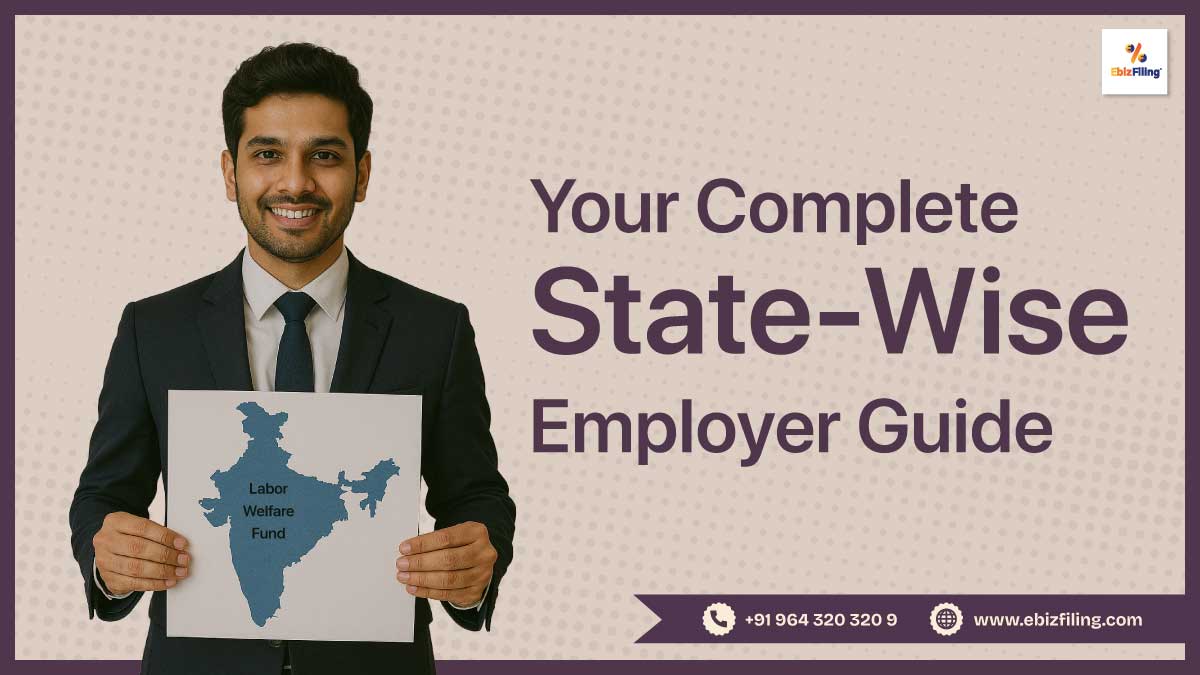What is Labor Welfare Fund (LWF) and Why Does It Matter?
Labor Welfare Fund is a statutory contribution managed by respective state labor boards to support worker welfare schemes such as housing, education, healthcare, and insurance. It promotes employee well-being, particularly for those in low-income brackets.
Real-Life Example:
In Maharashtra, the LWF is used to fund housing loans for industrial workers and scholarships for their children. Employers who fail to comply can face scrutiny and penalties under the Maharashtra Labor Welfare Fund Act.
Which States Have Made LWF Mandatory?
Not all states implement LWF. Here are states where LWF is compulsory:
- Maharashtra
- Gujarat
- Karnataka
- Tamil Nadu
- Madhya Pradesh
- Andhra Pradesh
- Telangana
States like Delhi, Haryana, Rajasthan may not have mandatory LWF contribution currently.
How Much is the LWF Contribution and When is It Due?
Here is a state-wise table detailing employer and employee contributions, due dates, forms, and portals:
| State | Employer Share | Employee Share | Frequency | Due Dates | Return Form | Portal |
| Maharashtra | ₹12 | ₹6 | Half-Yearly | 30th June & 31st December | Form A1 | mahakamgar.maharashtra.gov.in |
| Gujarat | ₹6 | ₹3 | Half-Yearly | 30th June & 31st December | Form D | olms.gujarat.gov.in |
| Karnataka | ₹20 | ₹20 | Yearly | 15th January | Annual Form | labour.karnataka.gov.in |
| Tamil Nadu | ₹21 | ₹14 | Half-Yearly | 30th June & 31st December | Form V | labour.tn.gov.in |
| Madhya Pradesh | ₹20 | ₹10 | Yearly | 31st July | Form LWF-1 | mpwelfareboard.nic.in |
| Andhra Pradesh | ₹30 | ₹30 | Yearly | 31st January | Form A | labour.ap.gov.in |
| Telangana | ₹30 | ₹30 | Yearly | 31st January | Form A | labour.telangana.gov.in |
How Can Employers Ensure LWF Compliance?
Employers must follow these steps to stay compliant:
- Check Applicability: Visit the official labor welfare board website of your state to confirm if LWF applies to your establishment.
- Calculate Contribution: Calculate employee and employer shares based on state-specific rates.
- Timely Payment: Deposit the amount through approved payment modes (treasury challan, online banking, etc.) before the due dates.
- File Returns: Submit the required return forms (e.g., Form A, D, A1) as prescribed by your state.
- Maintain Records: Keep payment receipts, challans, and return forms for inspection.
What are the Benefits of LWF for Employees?
LWF offers various benefits, especially to low-income employees:
- Medical Assistance: Subsidies or reimbursements for healthcare expenses.
- Educational Support: Scholarships and financial aid for children’s education.
- Housing Aid: Funds or loans for affordable housing.
- Retirement Support: Support funds for workers post-retirement.
- Skill Development: Sponsorship for vocational training or upskilling.
- Maternity and Childcare Help: Financial help for women employees during maternity leave.
What are the Consequences of Non-Compliance?
Failing to comply with LWF regulations may result in:
- Monetary Penalties: Penalties vary by state and are usually levied per day of delay.
- Legal Action: May involve prosecution or show cause notices by state authorities.
- Loss of Benefits: Employees may lose access to welfare schemes.
- Reputational Impact: Non-compliant companies may be blacklisted or reported publicly.
What Challenges Do Employers Face in LWF Compliance?
While LWF aims to benefit employees, businesses may face the following challenges:
- Varied State Laws: Each state has different rules, rates, and forms.
- Manual Processes: Some states still require physical submission of returns.
- Awareness Gaps: Many small businesses are unaware of LWF obligations.
- Tracking Due Dates: Different due dates can cause confusion and delay.
Step-by-Step: How to Register and File for LWF
- Visit State Labour Board Website: Navigate to your state’s official LWF or labour department portal.
- Sign Up/Register: Create an employer account with your organization details and contact info.
- Fill Out Establishment Details: Enter employee count, wages, and other relevant data.
- Calculate & Make Payment: Use the online calculator or table as reference; pay via net banking or challan.
- Download Payment Receipt: Save the receipt or challan issued by the treasury.
- Submit Return Form: Upload the correct form (e.g., Form A1, D, etc.) along with proof of payment.
- Record Filing Confirmation: Take a screenshot or print the acknowledgment for your records.
Useful Government Links
- Ministry of Labour & Employment
- Maharashtra LWF
- Gujarat LWF
- Karnataka LWF
- Tamil Nadu LWF
- Madhya Pradesh LWF
- Andhra Pradesh LWF
- Telangana LWF
Conclusion
The Labour Welfare Fund (LWF) is not just a statutory requirement; it is a tool to empower employees and support their well-being. While rules and rates vary by state, staying compliant with LWF regulations ensures your employees receive their rightful benefits and your organization avoids penalties. Always refer to your respective state’s official website and stay updated on changes in LWF policies.
Suggested Read :
Should Employers Add NPS to CTC
Employee Structure of Pvt Ltd Company
Role of CSR in Employee Engagement
Understanding Leave Policies in India
Employee Rights During Striking off Company











February 20, 2026 By Steffy A
Why Ignoring Compliance Can Harm Business Reputation? Introduction Ignoring compliance harms business reputation because it breaks trust with customers, investors, and stakeholders. When a company fails to follow regulations, it signals poor responsibility and weak governance. This can lead […]
February 19, 2026 By Steffy A
Why Automation Is Becoming Essential for Business Compliance Introduction Companies today must follow multiple regulations, maintain proper records, and respond quickly to audits or legal updates. Traditional manual methods are no longer enough to manage growing compliance demands. Automation […]
February 18, 2026 By Steffy A
Consulting Firms vs Compliance Platforms: Which to Choose in 2026? Introduction At Ebizfiling, we often hear this question from clients: “Why hire a consulting firm when compliance platforms are cheaper?” While compliance platforms are more affordable, they often […]